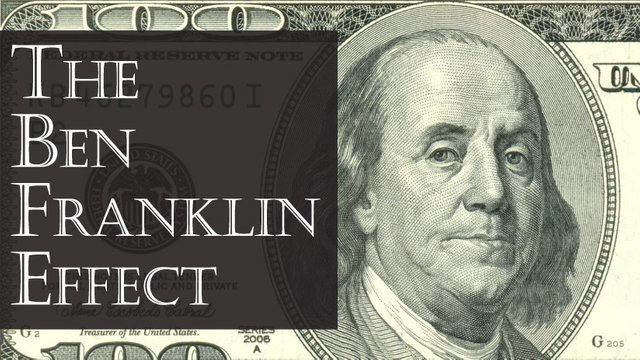The Ben Franklin Effect - Cognitive Biases (Pt.13)

The Benjamin Franklin Effect has recently been proposed as a cognitive bias psychological phenomenon. There is a tendency to continue doing something once we've started doing it. This applies to both positive or negative actions.
If we do a favor for someone, we are more likely to do another favor for that same person in this case, than to do a favor for them if we hadn't done them a favor already, or if we had instead first received a favor from them.
It's a sort of reverse likability psychological effect. Instead of you doing someone a favor and them liking you, you ask them for a favor, and they like you for it. It implies a likability on your part for even asking them.
We justify continuing to do favors by internalizing the reasoning is based upon us liking them. We can also use the same mechanism for justification to not do favors and also to justify doing a wrong to someone instead. Learning to hate someone that we did a wrong to, possibly by dehumanizing them, allows us to justify what we did.
An example is of soldiers who kill or murder others and come to hate the enemy through psychological gymnastics that helps them to decrease the dissonance, discomfort, anxiety, insecurity, contradiction and conflict of taking another's life.
Generational animosity or hatred towards other groups can also make more sense through this Ben Franklin effect. There are vendettas that take place between families are clans and even between various cultures. One example from the United States is the generational feud between the Hatfield and McCoy's.

source
"Once we start, we may not be able to stop and engage in behavior we would normally never allow."
“Jailers come to look down on inmates; camp guards come to dehumanize their captives; soldiers create derogatory terms for their enemies. It’s difficult to hurt someone you admire. It’s even more difficult to kill a fellow human being. Seeing the casualties you create as something less than you, something deserving of damage, makes it possible to continue seeing yourself as a good and honest person, to continue being sane."
In either positive or negative cases of the Ben Franklin effect, we are engaging in a process of identification or de-identification with our sense of self, self-view or self-image.
In the positive sense, when someone asks us to do a favor for them, we identify with them through likability of them appearing to like us enough to ask us a favor, which engenders a reciprocal likability in ourselves. Liking someone applies in the valuation or salient sense, but also in the likeness, similarity, same kind, etc. So we identify on that basis of them as ourselves to some degree through the kin-kind-like-similarity as part of the reverse likability.
In the negative sense, we may de-identify with another to justify doing something wrong to them. To find ways to not like them and excuse what we did, we make them less like us, less identified with our sense of self, and we dislike them as a result.
Origin
The origin of it all comes from Benjamin Franklin of course.
Franklin said:
"He that has once done you a kindness will be more ready to do you another than he whom you yourself have obliged."
Franklin wrote in his autobiography about dealing with the animosity of a rival legislator:
"Having heard that he had in his library a certain very scarce and curious book, I wrote a note to him, expressing my desire of perusing that book, and requesting he would do me the favour of lending it to me for a few days. He sent it immediately, and I return'd it in about a week with another note, expressing strongly my sense of the favour. When we next met in the House, he spoke to me (which he had never done before), and with great civility; and he ever after manifested a readiness to serve me on all occasions, so that we became great friends, and our friendship continued to his death."
Studies

source
Research by Jecker and Landy (1969) involved asking some students to participate in a competition to win money. Once completed, the winners were divided into three groups. The first group was asked by the researcher to return the money so he could use it because it was previously using his own funds to pay for the winners and has come up short. A second group was asked by the secretary, not the researcher themselves, to return the money to the researcher because department funds are low, not because the research have funded it himself. The third group was not approached to return any money.
Afterwards, the groups were all asked how much they like the researcher. The first group like in most, the second least, with even the third group favoring him more than the second group. These findings indicate that requests or favors from an intermediary decreases someone's likeness and willingness to help someone because they aren't asking themselves personally, since a direct request does increase likability.
Another test had a "teacher" use positive and negative reinforcement on someone doing a task who was also in on the experiment, while subjects watched the interaction. They were praised for success in one test, and insulted for failure in another. The subjects of the experiment were asked to judge the attractiveness or likability of those who receive positive or negative comments. The reinforcement of someone else's attitude affected the subjects who were asked to judge those people, and biased them towards whatever attitude the teacher displayed towards the task taker.
"Across the board, the subjects who received the insults were rated as less attractive than the ones who got encouragement."
The Ben Franklin effect can also be used as a technique to rapidly build rapport in sales relationships, like gaining a desired client. Instead of offering to help the client, ask the client for assistance. Ask them for their insight and to share what product benefits their most attracted to, where they think the market is headed for this business, or what products they might be interested in several years from now.
References:
Previous Cognitive Bias posts:
• Cheerleader Effect - Cognitive Biases (Pt.12)
• Bias Blind Spot - Cognitive Biases (Pt.11)
• Belief Bias - Cognitive Biases (Pt.10)
• Base Rate Neglect - Cognitive Biases (Pt.9)
• Bandwagon Effect - Cognitive Biases (Pt.8)
• Backfire Effect - Cognitive Biases (Pt.7)
• Automation bias - Cognitive Biases (Pt.6)
• Anthropomorphism - Cognitive Biases (Pt.5)
• Availability heuristic - Cognitive Biases (Pt.4)
• Attentional Bias - Cognitive Biases (Pt.3)
• Anchoring or Focusing Effect - Cognitive Biases (Pt.2)
• Ambiguity Effect - Cognitive Biases (Pt.1)
Bias Category: Decision-making, belief, and behavioral biases
Do you want to learn more? ---> Wikipedia list of cognitive biases
If you appreciate and value the content, please consider:
@krnel
2017-01-04, 5pm

Hello @krnel,
Congratulations! Your post has been chosen by the communities of SteemTrail as one of our top picks today.
Also, as a selection for being a top pick today, you have been awarded a TRAIL token for your participation on our innovative platform...STEEM.
Please visit SteemTrail to get instructions on how to claim your TRAIL token today.
If you wish to learn more about receiving additional TRAIL tokens and SteemTrail, stop by and chat with us.
Happy TRAIL!

First, let me state uncategorically that I'm not spamming your posts, but you've lured me into your labyrinth with your links between posts.
There goes the rest of my Sunday.
I have to wonder if you're writing these from the aspect of already having studied marketing?
This is another classic tool i.e., "Can I ask you a favor?" in advertising copywriting.
There's also a similar usage in negotiation strategies.
Or are these just some of the fundamentals of human relations?
Great to have you comment ;) I don't like marketing or advertising due to the manipulative focus it tends to have. I understand some of it, but surely not as much as others. I write about these from my own understanding of consciousness/psyche. Fundamentals of human existence ;) to which marketers and advertisers play upon. It's all psychology for them. I believe they started hiring psychologists in companies at some point in the 1900's to make products sell better.
Yes, the early marketers discovered these "buttons" and they've had a century to polish their craft.
There are some people doing marketing now who actually point out that these are more or less hardwired into humans and they jokingly say things like, "Use these for good, not evil."
I've never been able to "market" something I didn't truly believe in though.
That's probably why I'm sitting in a wobbly chair, typing this on an old Dell keyboard in my home office instead of some corner office on Madison Ave.
It's nice though, I can hear the rain in the trees outside my window.
I really liked your article, increase my knowledge of the figure of benjamin franklin, thank you very much friends
"also to justify doing a wrong to someone instead."
It is a well known mechanism, and can be seen for instance by people giving homeless or out of work people the responsibility for their situation - Because they must have something wrong!! Or they would not be in this situation!
Of course part of it is the avoidance of responsibility. If you aknoledge that it is NOT the responsibilty of the homeless, you would be "forced" to do something.
Interesting, especially the part about the researcher. Had he asked me to return the money, you know what I would have told him. The part about internalizing hatred toward enemies in combat is particularly apt, although it is also possible to hate and respect someone at the same time.
interesting posts, @krnel thanks you
So krnel, do me a favor
This post has been ranked within the top 10 most undervalued posts in the first half of Jan 05. We estimate that this post is undervalued by $16.40 as compared to a scenario in which every voter had an equal say.
See the full rankings and details in The Daily Tribune: Jan 05 - Part I. You can also read about some of our methodology, data analysis and technical details in our initial post.
If you are the author and would prefer not to receive these comments, simply reply "Stop" to this comment.